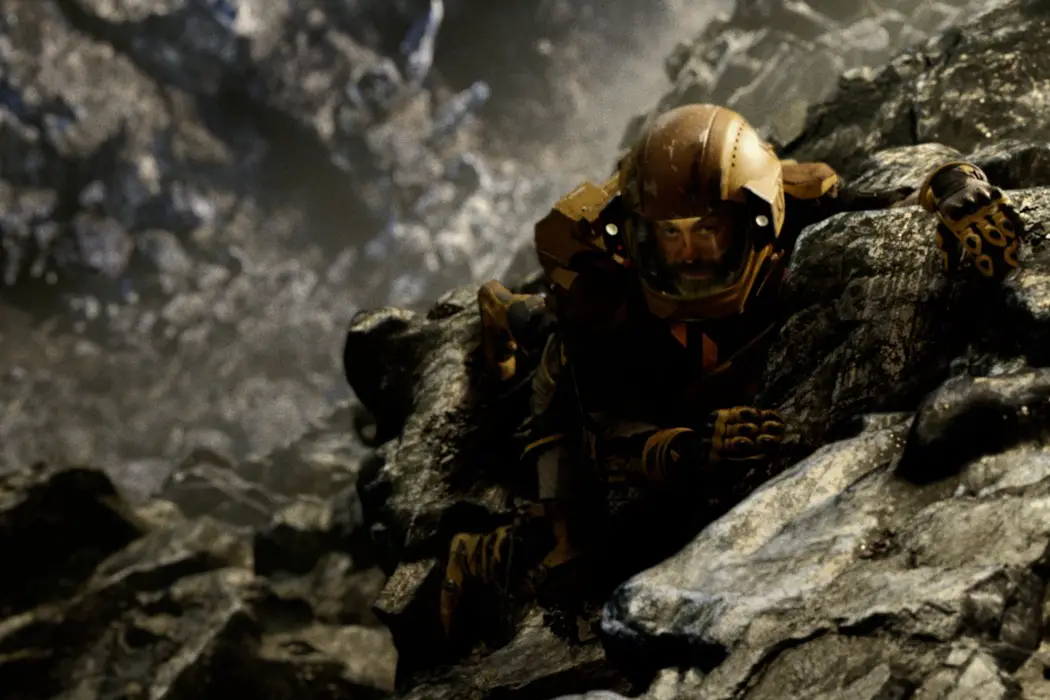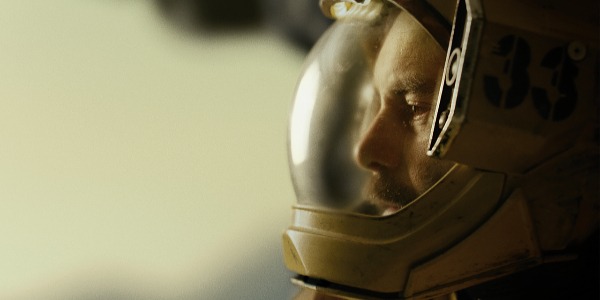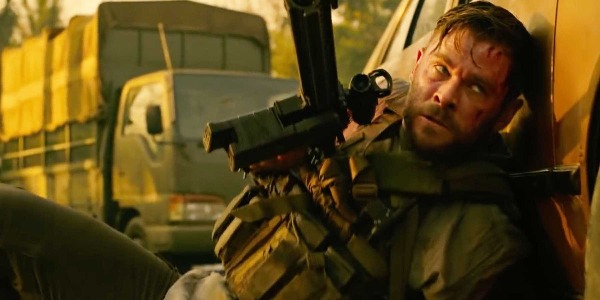Digital Down Under: How The Coronavirus Couldn’t Stop Australia’s Film Festivals

Alex is a 28 year-old West Australian who has a…
The first image in Antony Webb’s Carmentis is that of an immense fall, a grief-striken miner’s rocky descent back to the titular planet that once served as his desolate workplace. Dazed and confused, the dishevelled Mac (Ben Mortley) lays in the midst of this alien terrain, unsure of how – or even if – he should save himself in these fraught conditions.
Watching this sincere sci-fi short in the thick of 2020 has imbued it with an inevitable but welcome level of allegorical relevancy; it’s the confidence that no matter what challenges we may encounter in life, we can always adapt and overcome – a sentiment that’s been difficult to maintain as this year rages on.
Lost In Space
Carmentis was due to have its world premiere at Tribeca Film Festival this year, a massive achievement for its Perth-based creators, Director/Writer Antony Webb and Producer Jaclyn Hewer. A high-profile international debut like this – especially for an Australian production – has the ability to ignite a lengthy festival campaign that can work wonders for its creative team.
David Michôd’s coming-of-age short Crossbow having its premiere at the 2007 Venice Film Festival paved the way for his break-out feature, Animal Kingdom, just three years later. As Hewer told me over email, their primary aim was to ensure this film travelled in North America, with Tribeca being a great start in that regard.

“Being selected in competition at the Tribeca Film Festival has been fantastic, particularly one where the spirit of the festival is to bring the community back together through cinema and art” Hewer added, but on April 3, the Manhattan-based film festival, produced to attract artists back to New York in the wake of 9/11, was one of the first major festivals to be postponed by the outbreak of COVID-19.
“A positive for us is that we have signed with Ouat Media as our international sales agents” she continued, “They are a boutique short film distribution company who also have a strong focus on Oscar and festival strategy, and how best to capitalise on the circuit. Whilst all this is new to them as well (it’s new to everyone!) it is nice to have them in our corner as we try our best to give the film the best life it can in this uncertain time.”
What began as a buried headline in early January culminated in the entire world being put on pause by the end of March, as the coronavirus pandemic systematically changed our entire socio-economical dynamic in just mere weeks. The canary in the coal mine was the drastic, but in hindsight wise decision by Sony to shift the release of their latest James Bond venture, No Time to Die, from mid-April to the distant (and hopeful) future of November.
As theatres were forced to close when group gatherings were banned and social distancing caught on quicker than Tiger King, the rattled arts industry was hit from every direction, from halted film productions, titanic tentpoles being dumped to digital, government ignorance and the interruption of all film festivals – well, in their physical forms at least.
COVID-19 Cancellations
On a global level, Tribeca and Cannes pivoting to digital platforms was a seismic shock to the system, with these star-studded events being the last vestiges of the communal, theatrical experience. Within Australia, the first sign of smoke was the cancellation of the Sydney Film Festival, pulled just two months before its hotly-anticipated June launch.
This cinematic celebration usually begins the annual wave of Australian film festivals, preceding events in Melbourne (MIFF), Queensland, Adelaide and Western Australia (Revelation Perth International Film Festival), each with their own unique premieres and unfortunately for most independent productions, the only theatrical opportunities that they’ll ever receive.
From the outset, switching these events to streaming has seemed like the most painless route to recovery. The overnight success of Netflix’s quarantine releases such as Extraction and Tiger King have indicated a habitual reliance on streaming platforms, whether it be Netflix, Amazon or Disney Plus, to not only fill in the void left by the closure of cinemas but to act as the online residence for these cancelled festivals.
If it’s not South By Southwest decorating Amazon Prime with a handful of unsung titles back in April, it’s Netflix purchasing the hottest festival hits to brandish with their sanitised “Netflix Original” stamp, but festivals have always been more than their colourful lineups.

A deference to digital not only robs the audience of the singular theatrical experience but also hijacks filmmakers and prospective distributors/prospective buyers from gaging raw spectator reactions, as well as eliminating industry socialising, impartial media coverage and the collective civility of the whole occasion. This lack of incentive for either party is fortified by the extreme – and nowadays, natural – risk of piracy that occurs as soon as any picture makes its way to the web.
The viability of ensuring a practical and safe digital debut puts festival programmers at a disadvantage, with artistic tentpoles – A24’s upcoming lineup for example – opting to postpone or skip the oft-prolonged festival cycle entirely. Festivals depend on the big names to signal audiences towards their distinctive cinematic slates – there’s a clear reason why Palm Beach was Sydney’s Opening Night Gala last year – and without these notable names to adorn these upcoming online festival programs, they may be disregarded completely by the casual crowds.
According to Sydney Film Festival’s CEO Leigh Small, about half of their overall program had been selected before the shutdown slammed the brakes on everything. Last year, the acclaimed festival screened over 307 films from more than 55 different countries, including retrospectives on Agnès Varda and other defining female directors.
This year, the festival’s newly announced virtual adaptation has focused on just a trio of award showcases; the Documentary Australia Foundation Awards for Australian Documentary, the Dendy Awards for Australian Short Films, and the Europe! Voices of Women in Film program.
This initiative, whilst unmatched in content to its physical analogue, is a part of the “We Are One: Global Film Festival”, a free program where Sydney, alongside nineteen other cancelled film festivals (including Tribeca), will exhibit a collection of their originally scheduled selections on Youtube from 29th May to 7th June.
This unspoken exchange of high-demand titles in favour for further attention towards independent efforts, as well as the reduced gatekeeping when it comes to audience attendance (between the hiking costs of travel, ticket prices and spacial availability), could have the beneficial effect of engaging possible viewers and demographics who are usually stonewalled from such experiences; On Youtube, anybody can behold the hard work of all the filmmakers currently fighting against the stream.
Altered States
The Melbourne International Film Festival – this year winkingly retitled MIFF 68½ – on the other hand, is aiming to replicate the pure festival experience online, using a ticketed access system that Al Cossar, the festival’s head of programming, has promised will “not have the scale of a regular festival, but it will certainly have all of the heart.”
The brand-new streaming platform for MIFF 68½ comes via Shift 72, whose client list includes American festival SXSW and Europe’s CPH:DOX, but this cutting edge technology isn’t what’s important to Cossar, to him it’s “fostering audiences, sustaining community and community building”.
While news outlets reporting that cinemas may open themselves up in July – with Christopher Nolan’s blockbuster Tenet as the tempting bait – it doesn’t mean these spaces will “return to normal”, or that audiences will even want to invade them even when permitted. Cossar, as well as the sprawling staff who make MIFF such a stand-out affair, considered where we might be in August before announcing their transfer to the digital screening world.

“Everything is so unexpected at the moment, everybody’s speaking completely from a place of uncertainty by default because there’s no other way you can talk about it. Even in projecting further down the track, and whether you set that path back in terms of normalisation in six months or twelve months, there are some real layers of complexity there.
When you can reopen cinemas, that’s one thing, but the next layer is, there’s still gonna be gathering bans which limit your capacity to realise those venues. There’s going to be social distancing regulations and recommendations that are gonna further dilute the ability to collectively gather an audience together and be in a room together for a film community in a way that we traditionally have right up until this point.”
Films of the Future
The ripple effects of such a disruptive time will not only end this year, as Jack Sargaent, curator and film programmer at Perth’s Revelation Film Festival – which will have a digital festival on their personal jam-packed streaming platform RevOnDemand, before a possible physical ceremony later this year – believes that “people will want films that take them outside again, but also films that aren’t big budget but are personal. Soon we’ll all know one person who has died, and that will have an effect on the kind of art people want to see and want to make”.
But what will people want to see once the cinemas are secure again; is it angry cinema, political cinema or more horror films? Sargaent has no idea, but he proposes that “powerful works will come out of this, but we may not see them for years”.
Transmission Films, the mighty Australian distributor whose past releases have included commercial and critical sensations like Jennifer Kent’s The Nightingale and Rachel Griffith’s Ride Like a Girl, may be holding the two most persuasive post-quarantine pictures. Andrew Mackie, one of Transmission’s co-founders, recognised that the million-dollar question at the moment was whether audiences will want to return to cinemas when allowed, and if so, what films they’d actually want to see.
For Mackie, he believes that “when people feel safe they’ll return to the cinemas in great numbers, as they’ll want to get out of the house. For those who love going to the movies, the pandemic has reinforced what it is they love about the theatre experience”.
Their two cancelled Australian releases were the spirited Helen Reddy biopic I Am Woman and the cheeky meta-comedy The Very Excellent Mr. Dundee, which stars Paul Hogan as himself, confronting Crocodile Dundee’s vigorously-debated legacy and the ocker comedian’s own troubled descent from stardom. Both titles, which are tempting local audiences with a beguiling mixture of optimism and nostalgia, may spotlight the genre of film that crowds will flock to when possible: the feel-good feasts, or to paraphrase Emily VanDerWerff’s perfect summation of the cosy delights of Book Club, they’re more of an afternoon than a movie.
Mackie anticipates that grounded, darker dramas – for example, Hearts & Bones, one of the first Australian releases to swap its pandemic-delayed theatre release in favour for a digital drop – won’t go away post-quarantine, but they’ll definitely be harder to market.
Perseverance Is The Key
Even if audiences choose to return, will the festivals be there for them, or will we see a paradigmatic shift to these industry events lodging themselves online permanently? The rush to reopen cinemas isn’t as urgent or widely demanded as the return of restaurants, pubs or even music festivals, but the sense of escapism, the divorce from a bizarre modern reality which already feels lifted from a science-fiction feature, is a singular desire that will never be severed, no matter how convenient catching Trolls: World Tour at home may feel right now.
For Jaclyn Hewer, perseverance is the key. “We could end up seeing a resurgence in going to the cinema as people seek out favourite pastimes they missed in isolation. Drive-ins are being reopened in Australia and North America and no doubt in other territories in response to the pandemic, so you never know”.
Finding out whether the injured miner from Carmentis survives his drastic trek, or if we’ll see an eventual return to a thriving Australian film industry next year, can both be answered by the same simple action; by attending these film festivals, either in-person or from home, and seeing for yourself.
Film Inquiry would like to thank Jack Sargaent, Jaclyn Hewer, Antony Webb, Leigh Small, Al Cossar, Andrew Mackie, Lauren Elliott, Natalie Cameron, Tiki Menegola and Suzanne Worner for their assistance with this article.
Does content like this matter to you?
Become a Member and support film journalism. Unlock access to all of Film Inquiry`s great articles. Join a community of like-minded readers who are passionate about cinema - get access to our private members Network, give back to independent filmmakers, and more.













